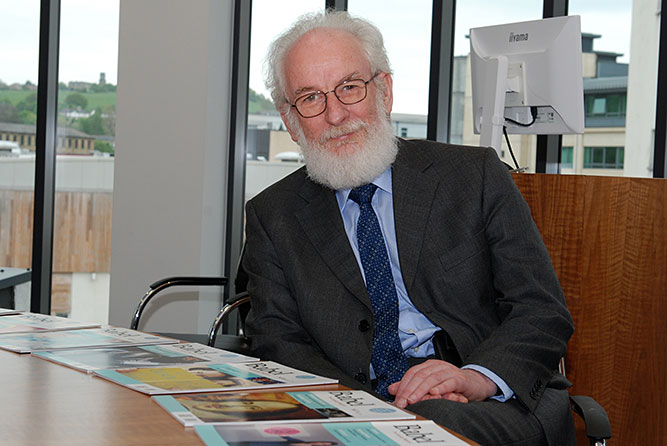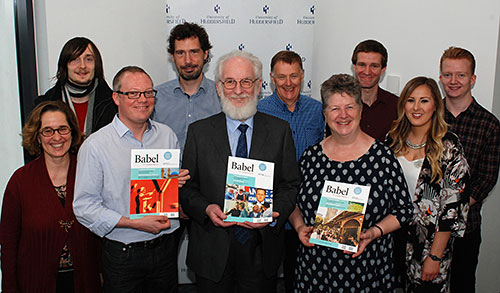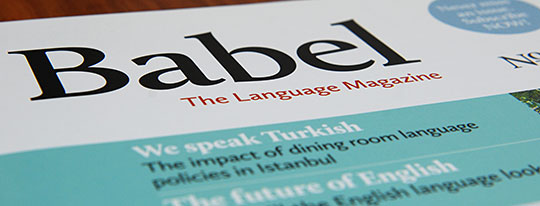“It’s not what you say, it’s the way that you say it.”

Mon, 16 May 2016 13:22:00 BST
Celebrated linguist, writer and broadcaster Professor David Crystal gives the second annual Babel Lecture
 ► Members of the Babel Editorial Advisory Board
► Members of the Babel Editorial Advisory Board
ELEMENTS such as rhythm, stress and pitch are vital components of speech and they vary across continents and cultures. But tone of voice is the “Cinderella of linguistic science” because it is so difficult to write down, according to Professor David Crystal, one of the world’s most respected scholars in the field.
So when he delivered a public lecture at the University of Huddersfield, Professor Crystal overcame all the notational difficulties by giving a virtuoso verbal demonstration of the many factors that create “The English Tone of Voice”. A sell-out audience was instructed and entertained when the famous linguist displayed immense vocal flexibility – for example, in a passage when he illustrated seven different ways in which the word “yes” could be spoken. Every time there was a subtly different connotation.
The event was the second annual lecture given under the aegis of Babel, the language magazine created and edited by two University of Huddersfield professors and their colleagues. Professor Crystal, who is the author of a long sequence of books and whose expertise in regularly featured on BBC TV and radio, is a consultant to Babel and he prefaced his lecture at St Paul’s Hall by praising the magazine.
“Babel is just fantastic. I have been waiting for this journal all my life!” he said.
He went on to state that tone of voice was a widely neglected area of linguistics. “But without knowledge of it you have missed half the story of language. It’s not what you say, it’s the way that you say it.”
Pitch, loudness and speed, which combine to create rhythm, are the fundamental attributes of speech, according to Professor Crystal. He also analysed and demonstrated some of the more occasional aspects of tone, such as a rising and falling intonation that in Britain indicates uncertainty but which in the USA has no particular meaning. Such cultural differences can lead to misunderstandings.
Professor Crystal analysed the “uptalk” intonation at the end of statements that has become more common in British speech and is a widespread bone of contention. It can, however, be traced back to 18th century Wales and later became a feature of American speech, migrating to New Zealand by the 1970s and then to Australia and – via the soap opera Neighbours – back to the UK.
English is historically a “stress-timed” language – in which stressed syllables are said at roughly regular intervals – but now that it is used by some two billion people around the world, it is increasingly being spoken in a “syllable-timed” way, with every syllable occupying the same amount of time.
The typical Indian-English speech pattern is an example of this, said Professor Crystal. Also rap and hip hop speech is syllable-timed and this is influencing the ways in which young people speak.
 As the large audience assembled for the 2016 Babel Lecture, an animated film was shown that illustrated the origins of the magazine, which has now reached 15 issues. It is co-edited at the University of Huddersfield by Professors Lesley Jeffries and Professor Dan McIntyre with assistant editor Dr Jane Lugea.
As the large audience assembled for the 2016 Babel Lecture, an animated film was shown that illustrated the origins of the magazine, which has now reached 15 issues. It is co-edited at the University of Huddersfield by Professors Lesley Jeffries and Professor Dan McIntyre with assistant editor Dr Jane Lugea.
The two professors both gave short introductory speeches at the lecture, with Professor Jeffries recounting the influence that David Crystal had had on her choice of career.
“He has the ability to communicate complex linguistic ideas to the general public and is the go-to man for linguistics on radio,” she said, adding that Professor Crystal often got the better of a grumpy John Humphreys when the Today presenter was complaining about aspects of modern speech.
In 2014, Professor Crystal, who has the OBE, was awarded an honorary doctorate by the University of Huddersfield and in a special video interview he talked about a wide range of topics, including Shakespeare and Downton Abbey.







